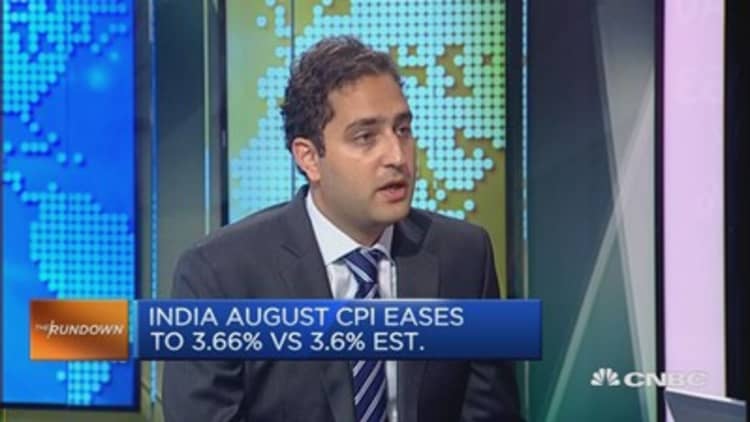The Reserve Bank of India (RBI) ought to push ahead with an interest rate cut at its policy meeting on September 29, even if the Federal Reserve decides to embark on a rate hiking cycle this week, says former deputy governor Subir Gokarn.
"The key driver of the Fed's decision is going to be domestic. Similarly, the key determinant of the Indian decision on interest rates must be what domestic conditions are," Gokarn, who is presently the director of research at the Indian arm of global think tank Brookings Institution.
"Our growth is a bit sluggish – and inflation is way, way down. I think the situation argues in favor of cutting rates," he said.
India's gross domestic product (GDP) growth fell short of expectations in the second quarter, reflecting a slowdown in the service sector that accounts for more than half of the $2.1 trillion economy. Growth slowed at an annual rate of 7 percent in the April-June period, down from a 7.5 percent expansion in the previous three months.
Consumer price inflation, meantime, eased to new low of 3.66 percent in August from a revised 3.69 in the previous month, largely on account of falling commodity prices.

The RBI has reduced its key policy rate a total of 75 basis points this year, standing pat at its last policy review in August. The repo rate, the level at which the central bank lends money to commercial banks, currently stands at 7.25 percent.
Gokarn believes India's economy can withstand monetary tightening in the world's largest economy.
"We have to contrast this with the 'taper tantrum' that precipitated enormous upheaval in the Indian external sector. That time the key source of vulnerability was the very large current account deficit – today its 1.2 percent of GDP, so the vulnerabilities are much, much less this time around," he said.
"That in itself allows us to make a judgment that the turbulence will be much less than it was two years ago."
Taper tantrum refers to the dramatic episode of capital flight out of emerging market in the summer of 2013, triggered by jitters over the Fed scaling back its massive monetary stimulus. Indian assets came under heavy selling pressure as investors shunned markets with shaky economic fundamentals.
Read More Modi adviser Panagariya puts pressure on RBI to cut interest rates
RBI Governor Raghuram Rajan, who is under pressure to cut rates from the government and industry, has been a proponent of the Fed getting on with its policy normalization sooner rather than later.
"It's preferable to have a move early on and advertised, a slow move up rather than the Fed be forced to tighten more significantly down the line," Rajan said last month.
Economists are currently split over what Rajan's next move will be. According to a Reuters poll published in late August, 60 percent of the 21 economist surveyed expect the central bank would cut rates this month.
Radhika Rao, economist at DBS, says she is in the "hold" camp if the Fed raises rates this week.
"In a remote chance that the U.S. raises rates in Sept, we reckon that the RBI will sit on its hands for the time being to allow markets to stabilise and price in further rate increases, before pushing domestic rates lower," Rao wrote in a note.


